The Best Long Angeles MBA Return on Investment Bets

Return on Investment (ROI) is one of the most important factors a prospective MBA can take into consideration when choosing the right business school.
Of course, the true value of each MBA program may ultimately be something impossible to measure. The kind of connections made through professional networking, the soft skills that students attain which help them navigate through both their personal and professional life—these aren’t things that can be easily quantified. But, thankfully, factors like average salary increase, rate of post-graduate employment and the overall tuition of a program are. And these numbers can help students start to better see an overall picture of what each MBA is worth.
The Best Long Angeles MBA Return on Investment
The Marshall School of Business – USC
The Marshall School of Business at the University of Southern California is consistently one of the top ranked MBA programs in the state of California and even throughout the country. Specific ROI aside, these sorts of honors should also be a factor when considering the overall value of the program: for example, Marshall has been named the third best program for “Most Satisfied Business School Graduates” by Forbes and sixth on The Economist’s ranking of “Best Alumni Networks.”
Based on tuition for the 2017-18 school year, the total expense (tuition, fees and living expenses included) to pursue a full-time MBA at Marshall would be $95,881 for the first year and $82,522 for the second, for a total of $178,403.
Now take into consideration the fact that the average salary for graduates of Marshall’s full-time MBA program within three months of graduation is $115,309, and that the large majority of job offers (38 percent) for MBA students came from on-campus recruiting or job postings through the university. The second highest source of employment (21 percent) came from internships held while in the MBA program. Furthermore, a number of top organizations—such as Apple, AT&T, and Walt Disney Studios—hired the graduates of Marshall’s 2016 MBA class. All of these factors boost the overall ROI of Marshall’s program, making it one of the top valued programs in L.A.—even with the high price tag.
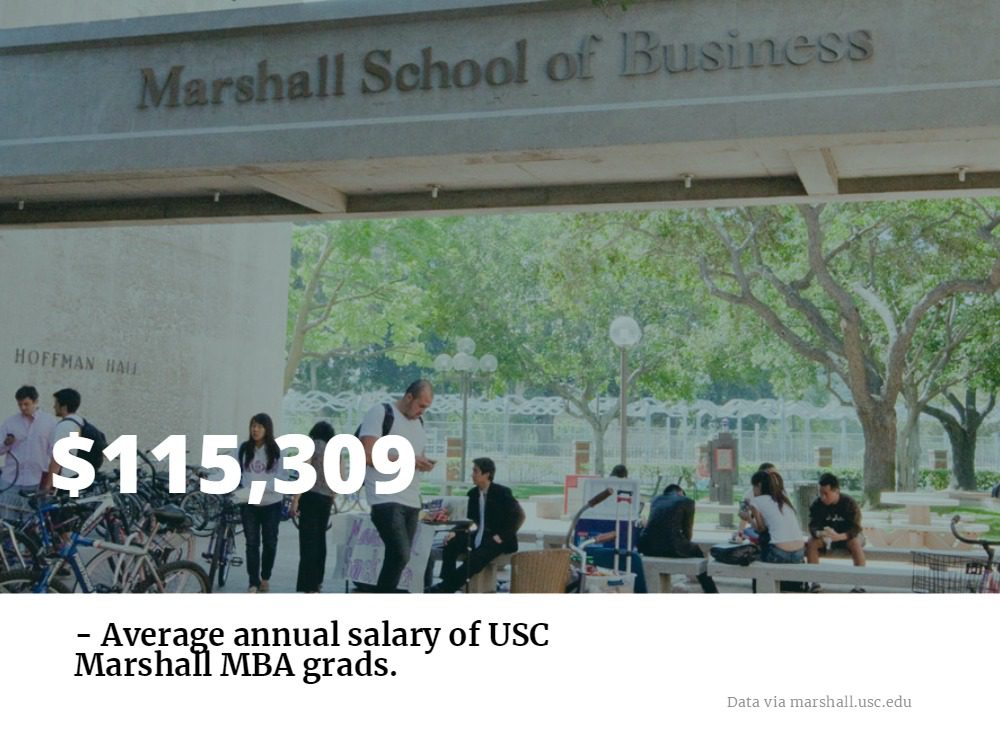
Anderson School of Management – UCLA
The Anderson School of Management at UCLA is another program which offers a high ROI when considering the types of opportunities and salaries available to students after graduation. While the tuition cost is certainly high—roughly $194,220 (including fees and living expenses) for the the two years of the program, the benefits to students are undeniable.
A look at the full-time employment report for the most recent MBA class finds that 92.4 percent of students were offered full-time employment within just three months of graduation, with 87.7 percent acceptances. By far (72.2 percent) , students found their employment opportunities through Anderson-facilitated resources, such as internships, on-campus recruiting, or from UCLA Anderson alumni and classmates.
The salaries for graduating Anderson students also reveals a positive trend: the average post-graduate compensation was $118,150, with 70.6 percent of students earning signing bonuses of up to $89,500. The connections sewn by Anderson internships and alumnae also reveal a significant payoff in the types of organizations hiring Anderson alum: companies like NBC Universal, IBM, Barclays, Google, and other major corporations now have Anderson MBA graduates on staff.
The Paul Merage School of Business – University of California, Irvine
The UC Irvine Paul Merage School of Business is one of the top business schools in the Los Angeles metro area, as evidenced by its consistently high rankings from various publications, such as the Financial Times and U.S. News & World Report.
With the program’s recognition for its high lifetime earnings combined with the relatively low cost the degree, it’s no surprise that that the program at UC Irvine produces a high return on investment. The estimated total annual cost of an MBA at Merage ranges from $67,422—$83,967, depending on if you whether or not you are a resident of California and whether or not you will be using campus. This is compared with an average post-graduate salary of $97,808 for the 2017 graduating class. About 50 percent of all students were employed by graduation, and 81 percent held full-time jobs within three months.
Graziado School of Business and Management – Pepperdine University
One of the reasons Pepperdine’s Graziado School of Business boasts such a high return on investment is the many different formats in which students can pursue a full-time degree. With the opportunity to take the full-time MBA over the course of 12, 15, or 20 months, the Graziado MBA typically costs less overall ($74,250 for the 12-month program, $99,000 for all others) and means less time away from a full-time paycheck.
Combine this with the success rate of 82 percent of students accepting job within three months after graduation and a $120,000 starting salary (at highest), and its understandable why Graziado graduates find incredible value in their degree.
How Can You Score a Job at Salesforce with an MBA?

Salesforce, one of the country’s highest valued cloud computing companies, is actively looking for promising MBA graduates, offering diverse opportunities in tech, business, and sales. Since it’s founding in 1999, Salesforce has been growing wildly, becoming the first enterprise cloud company tor each $10 billion in revenue as of August 2017. And Salesforce isn’t just remarkable for its product’s success—the company was also rated as the “#1 Best Company to Work For” by Fortune.
The Salesforce culture is centered around the idea of “Ohana” (Hawaiian for “family”), and earned its place at the top of the list by offering incredible benefits to its employees—both monetary and mentally. It’s understandable why MBA’s would want a job at Salesforce Ohana, with their focus on helping strong performers find new challenges and opportunities for growth.
What Does Salesforce Look for in New Hires?
Salesforce makes recruiting a priority at every level through their Futureforce University recruitment program. Salesforce offers new hires the same incredible opportunities available to all of their employees—seven days of paid time for volunteering, networking opportunities, and access to the Executive Lunch & Learn and Speaker Series that puts interns and new hires in direct contact with Salesforce leadership.
Because of Salesforce’s focus on having their employees give back to their communities, they seek out new hires who have made a demonstrated impact within their past efforts, whether at school or professionally. In 2015, Salesforce’s senior vice president of global recruiting, Ana Recio, commented on the different ways applicants could make themselves stand out.
“What did you do to differentiate your job from others?'” she said. “What was your absolute impact, your legacy? We always look for people who truly were kind of thought leaders and change agents.”
How to Get Your Foot in the Door?
MBA graduates and current students can apply directly for open roles. Current students will most directly benefit from the company’s MBA internship: a 12-week program that students can pursue during the summer in between years one and two of their program. Each summer, MBA interns are hired in the fields of product marketing, product management, CSG business analyst, corporate development, and data analytics. If recruiters think there might be a good fit, applicants will likely be given a 30-60 minute phone screening, followed by an interview with a hiring manager. Before offering the position, MBAs will likely have to partake in a panel interview/case study, presenting their professional and academic accomplishments.
Salesforce also recruits recent graduates (those who graduated in the last 12 months) in the fields of tech, sales, and business. The precise roles and interview process for each varies depending on the field.
How Well Does a Job at Salesforce Pay?
The majority of hires at Salesforce, both full-time and interns, are for tech-centric positions. However, the company does offer supreme compensation for those with business degree backgrounds—especially those with an MBA.
According to Payscale data, MBA graduates wit a job at Salesforce earn between $85,000 and $160,000 USD annually.
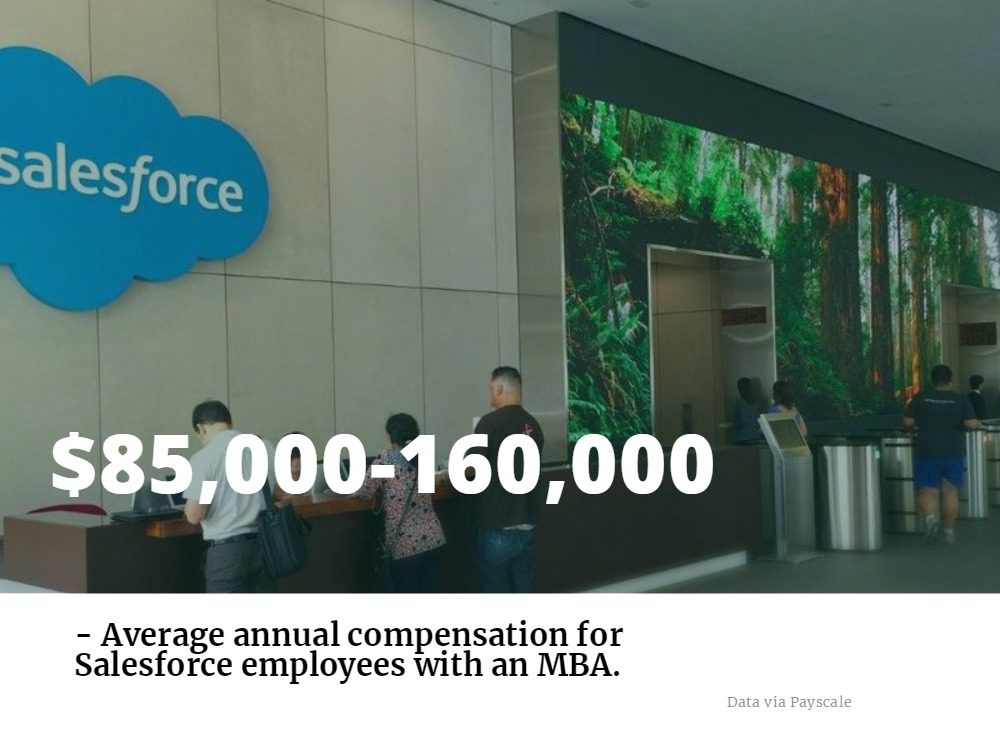
It’s no secret that one of the reasons Salesforce tops the Glassdoor list of “Best Places to Work” is the compensation. Although, as with any position, salary will vary depending on a number of factors, Glassdoor’s compensation of full-time employees shows a lower-end salary range of $60,000-80,000 annually (for account executives and sales engineers) and upwards of $141,000 for senior engineer positions.
What Do Current and Former Salesforce Interns Think?
Danielle, who interned with Salesforce as a product marketing MBA intern, commented on her work experience and Salesforce’s company culture in this video. “Not only am I working on independent projects as part of the internship, but I’m also shadowing people in my team and really seeing what a true day in the life is for a project manager within the app cloud,” Danielle said. “Other internships are very focused on their projects and feel very siloed but here at Salesforce I’m really able to be integrated with the team as a whole.”
Eamon, a software engineer who began at Salesforce as a recent graduate, also commented on his experience. “As a new grad what’s interesting is there really is no pathway you’re supposed to follow, it’s what you make of it,” he said. “It’s the people you go out of your way to meet, the experiences you make, the projects you decide to take on.”
School v. School: NYU Stern or Columbia Business School?
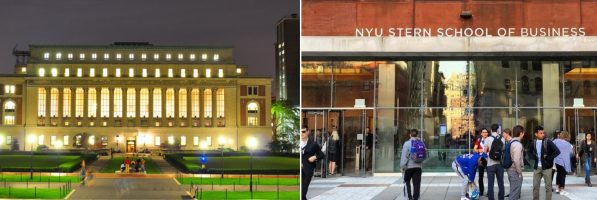
What happens when you pit two of the New York metro’s top business school’s against each other in a head-to-head duel of MBA might? It’s a school vs. school showdown, as we compare Columbia Business School to the Stern School of Business. Let’s take a deeper dive! Continue reading…
How To Break Into the Tech Industry: Intuit Inc.

Since 1983, Intuit Inc.—the Mountain View, CA software company that spearheaded the creation of products like TurboTax, Quickbooks, and Mint—has effectively changed the way the average person manages their money. And with more and more MBAs shedding their finance industry aspirations for a role in tech, a job with one of the most well-regarded tech organizations is looking especially ideal.
Why Should I Join Intuit Inc.?
Intuit Inc. was ranked 13th overall on Fortune’s 2017 list of the “100 Best Companies to Work For,” and 30th overall on Glassdoor‘s newest “Best Places to Work” list. The company takes a holistic approach to ensuring company well-being. Intuit has 24-hour onsite gyms, and even provides a certain amount of bicycles for employees who bike to work. Fortune listed job perks like telecommuting, compressed work weeks, college tuition reimbursement, daily free time to pursue other projects, and paid time off for volunteering.
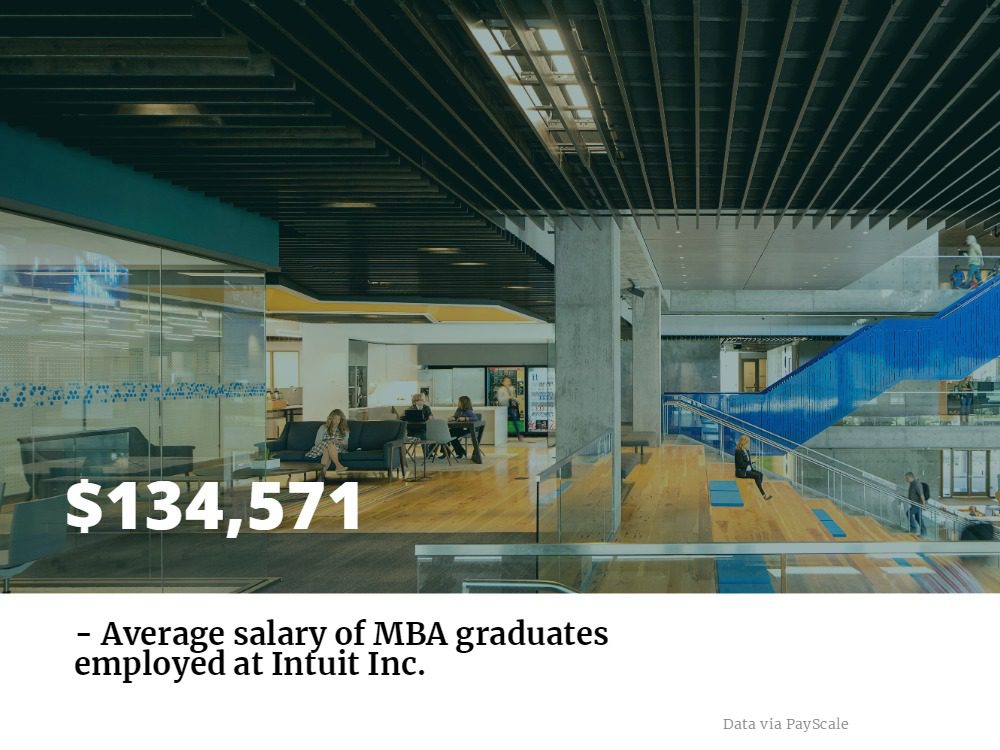
Many of the positions at Intuit are, unsurprisingly, tech-based, so an MBA may not be as advantageous in getting an engineering position. However, according to PayScale data, MBAs are typically the highest earners at Intuit, with the average MBA earning nearly $125,000 per year.
What Internships are Available?
Intuit Inc. has a specific internship for MBAs: the MBA Intern Marketing Manager position. This internship is offered in Intuit’s California locations in Mountain View and San Diego, as well as in Plano, Texas. In this position, MBAs help the company gain insight into the needs of customers and the effectiveness of current marketing strategies, through research and testing. According to the company website, these interns also have the opportunity to partner with teams working in, “Product Management, Development, Finance and Care.” This is a paid summer internship, so students can cover the cost of living while observing and contributing to innovations at a leading software company.
Intuit is currently offering a variety of other internship positions that might be appropriate for MBAs, such as a Marketing Intern position in London. MBAs specializing in Supply Chain Management can apply to be Supply Chain Specialist Interns, and work closely with Intuit’s Supply Chain Finance team.
At the company, it is not uncommon for intern’s to parlay their positions into full-time jobs after graduation. The company’s website says that its internship program, “is truly an ‘early identification’ program, focusing on identifying and investing in high potential university students really to encourage them in their early careers and potentially to bring their talent back to Intuit after graduation.”
How to Get Hired at Intuit
In recent years, Intuit has moved from a traditional interview process, to an innovative method of vetting candidates that incorporates virtual reality. Their hiring program, Assessing for Awesome (A4A), requires that candidates: “Speak for five minutes about themselves; speak for 15 minutes about two or three projects of which they’re proud; prepare a 15-minute presentation on a case study or coding exercise; participate in a 25-minute question and answer period.” The interview is conducted by an advanced staff member who works closely with the position in question. The company uses virtual reality to allow candidates to demonstrate their skill sets.
Intuit Inc. hires graduates and interns from a number of the top-rated business programs in the country, including the Northwestern University Kellogg School of Management in Chicago, Illinois, which brought in full-time employees and interns from the most recent graduating class. Some of the most highly-regarded MBA programs offer various tech industry advantages, including the recently introduced Tech MBA at NYU Stern, and the promising new Cornell Johnson Tech MBA, offered at the school’s new New York City campus.
For more information on which school’s provide the best opportunities to join the tech industry, head on over to our sister site Clear Admit, which recently took a look at programs from other established institutions like the UCLA Anderson School of Management and MIT Sloan.
Just How Much Are Stanford MBA Grads Getting Paid?

Wondering what kind of pay day you can expect if you are among the select 6 percent of applicants who gain admission to Stanford Graduate School of Business (GSB)? Are you sitting down? Perhaps you should be, because the school’s 2017 employment report—released today—reveals record-breaking salaries for the third year in a row.
On average, last year’s graduates, now in their first year of post-MBA work, are pulling down an annual base salary of $144,455—a $4,000 increase over last year’s all-time high (median base compensation was $140,000, also besting last year’s by about $4,000). But it doesn’t stop there. Average signing bonuses, reported by 51 percent of the class, are also up—setting a new record at $29,534. (Median salary bonuses remained unchanged at $25,000.) And as if that weren’t enough, another quarter of the class reported other guaranteed compensation (OGC) surpassing last year’s all-time highs by a whopping $10,000. Average OGC for 2017 grads was $83,065, and median OCG was $50,000. The range was $6,750 to $450,000.
The GSB, in announcing these most recent employment statistics, pointed out that OGC will no longer be tracked by the MBA Career Services and Employer Alliance (CSEA) and that it began last year capturing an “Expected Performance Bonus” metric in its place. This measure includes both guaranteed and non-guaranteed cash compensation based on performance. Though the average and median EPB for the Class of 2017, at $71,946 and $35,000, were each lower than OGC figures, a full 65 percent of the class expected to receive such performance-based compensation, up from 61 percent last year—and substantially higher than the quarter of grads who reported OGC. The reported range for EPB was $5,000 to $450,000.
Stanford MBAs claim higher pay days than graduates of any other school, in part thanks to higher base compensation. Stanford’s median base—$140,000—surpassed that of Harvard Business School (HBS) ($135,000), the University of Pennsylvania’s Wharton School ($130,000), and the University of Chicago Booth School of Business ($125,000). Grads from both Stanford and HBS reported the same median starting bonus of $25,000, but the $50,000 in other guaranteed compensation reported by Stanford grads was double what grads at the school’s top East Coast rival reported.
Tech Less of a Draw Than in Prior Years
Bucking the trend at many other business schools—where increasing percentages of students are clamoring to enter the technology industry—fewer Stanford MBA Class of 2017 grads headed into tech. In what the school deemed “a rebalancing of the scales among the three top industries,” interest in technology dropped 8 percentage points—to a mere 25 percent of the class. Almost a third of the class—32 percent—headed into finance, up a point over last year. Consulting, too, gained four percentage points to attract 20 percent of the most recent class.
“Our leading employers span a wide variety of industries,” Maeve Richard, assistant dean and director of the Career Management Center, said as part of a news story announcing the latest employment statistics on the Stanford GSB site. “They represent organizations in such areas as consulting, finance, technology, consumer products, healthcare, and nonprofits. What they do have in common is work environments that offer the ability to make an impact with a focus on agency, career development, diverse challenges, and responsibilities.”
Indeed, a record-setting 411 organizations hired Stanford MBA students and graduates for internships or full-time roles this past year—up 7 percent over last year and 34 percent from six years ago. A whopping 95 percent of employers hired just one or two students—an indication of the breadth both of GSB employers and student interest.
Uptick in Women Headed into Private Equity and Venture Capital
“In addition, we observed that the number of women going to private equity and venture capital has nearly doubled since 2014,” Richard said as part of the Stanford GSB article. “While we do not disclose fine-grain gender detail and the numbers are still small, we see a definite widening of the cracks in the glass ceiling.”
It’s no wonder that Stanford GSB women would increasingly be looking to break into PE and VC, since those fields yield some of the very highest pay days. The highest reported base salary for the Class of 2017—$285,000—went to a graduate headed into venture capital. Median base salaries for both PE and VC were $175,000, $40,000 higher than for the class as a whole. And it was a graduate headed into a private equity analyst role who reported the mind-boggling $450,000 in other guaranteed compensation. The median signing bonus for PE—at $50,000—was also the highest in the class (on par with investment banking). Though it was a graduate headed into a marketing role who claimed the highest signing bonus of the class, $77,000.
Timing and Location of Offers
Stanford GSB reports full-time offer and acceptance rates at graduation and three months out from graduation—as mandated by CSEA standards. But in past years—as this year—the school has made a point of underscoring the fact that its graduates’ confidence in their ability to find the perfect job sometimes means they hold out longer in accepting their ultimate position than graduates from some other schools. That said, 92 percent of the Class of 2017 had offers three months out from graduation—up two points over last year—and 88 percent had accepted offers, a five-point increase year over year.
In terms of where geographically the most recent Stanford MBA grads wound up, the West was the winner—with 62 percent of grads choosing to remain in the region. This represents a 3 percent decline compared to last year. “Counter to assumptions, only 35 percent of these West region jobs relate to technology,” the school notes. “Finance represented 26 percent, and consulting represented 15 percent.” The Northeastern United States drew the second-most Stanford grads, 16 percent of the class. Another 11 percent took international jobs.
Also of note, 16 percent of the class launched their own startups upon graduation, up one percentage point over last year. Leading industries for these entrepreneurial students include software (15 percent), finance (11 percent), healthcare (9 percent), real estate (9 percent), and internet services (9 percent).
More Grads Seek Socially Responsible Roles
Another notable shift in these most recent employment statistics is the increasing number of Stanford MBA grads heading into careers in socially responsible roles or organizations. Thirteen percent of this year’s graduates answered yes to the question, “Have you chosen a socially responsible role in a private business?” That’s up from just 8 percent last year, when the question was first introduced.
Watch this space for an upcoming piece that will highlight several Stanford students who chose internships focused on social impact this past summer—a Clear Admit exclusive.
This article has been edited and republished with permissions from our sister site, Clear Admit.
Your Future A.T. Kearney Career is Waiting for You

For many organizations, finding a candidate with an MBA degree on their resume is a shortcut to knowing how well they will succeed at the company. With the strong foundational business skills the degree provides, companies can feel safe hiring an MBA student or graduate.
Founded in the mid 1920s, A.T. Kearney is a Chicago-based global management consulting firm and on of the more active MBA recruiters. As of 2016, the company holds 60 offices in over 40 countries throughout the globe, with roughly 3,500 employees.
Why Work at A.T. Kearney?
A.T. Kearney has made a commitment to creating transformational experiences for its clients, it makes the same promise for its employees. The company strongly believes that diversity is a key part of its culture, and aims to create an inclusive environment where people of any background can find success. The firm is unique in its offering of personalized programs that can help each employee find the perfect path to career success. Programs like Success with Flex, which offers flexible scheduling options, Pathway for Parents, which provides resources for working caregivers, or the Encore program, which helps professionals reenter the workforce after a long break, demonstrate the company’s commitment to creating a positive work environment for all its employees.
On Glassdoor, anonymous current and former A.T. Kearney employees largely praise the consulting company, giving it an overall positive rating of 4.2. In context, that’s just outside of the “2018 Best Places to Work” top 100 ranking, making it one of the more attractive destinations for current and future MBA grads. Employees cite flexible scheduling and good health insurance policies among the myriad of benefits, but at the end of the day, the pay is what stands out.
According to Glassdoor data, compiled by CNBC, A.T. Kearney employees earn the highest median salary of any employer in the entire United States, with a median total base compensation of $175,000. And with some positively alluring bonuses, that puts employees in the $200,000 range.
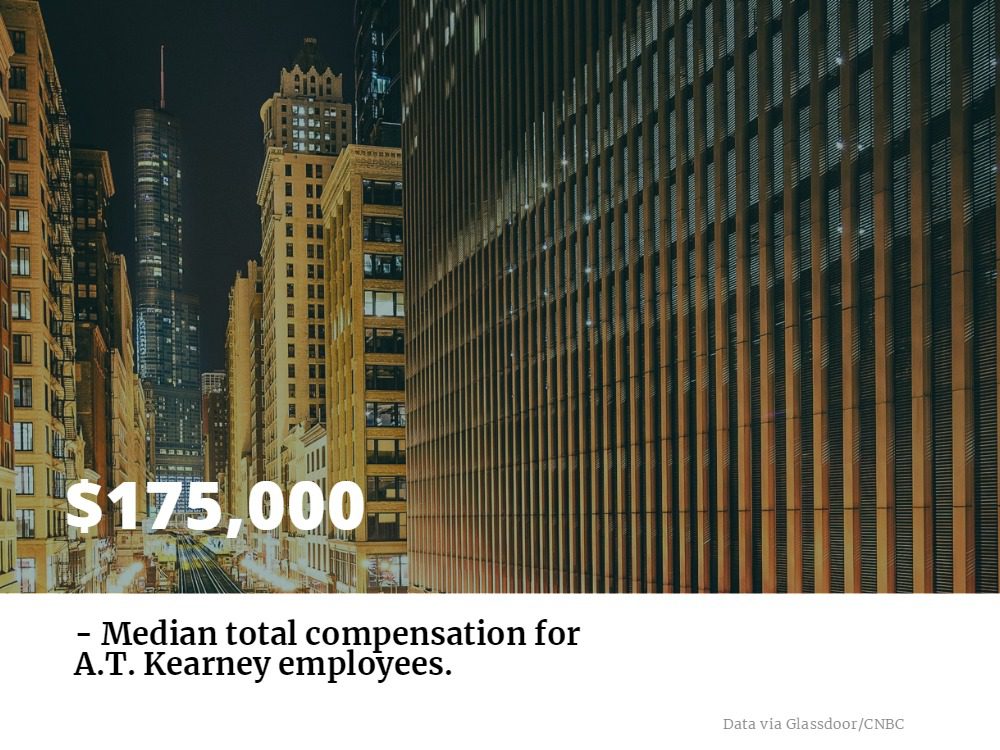
How To Get Your Foot in the Door
A.T. Kearney recruits talent in a number of ways. The company already works alongside a number of top business schools in the country, offering networking events, career fairs, and presentations on campus. Students can also begin the interviewing process right on campus. Even if the company does not offer programs at a particular campus, students can still apply directly through the website.
Another important way interested MBAs can get their foot in the door is through the Summer Consultant Program; a ten-week internship which teaches students about what its like to be a consultant at A.T. Kearney. The program starts with a three-day training program at a central location, helping interns to understand the company’s culture and specific approaches to consulting. After the three-day program, interns will return to their local offices and begin working on project assignments. At A.T. Kearney, Summer Consultants are treated the same as any other full-time associate and must collaborate with managers, principles and partners to create client solutions.
“The Summer Consultant Program allowed me to make an impact through my client work, get a real feel for the office’s culture, and, most importantly, build strong relationships with future colleagues at all levels of the firm. In all, the experience left me excited about the opportunity to join the firm full-time,” says Kate Maheu, a full-time associate who started as a Summer Consultant in 2013.
What Types of Jobs are Available?
From summer consultants and beyond, A.T. Kearney has a number of jobs for which they are seeking talented MBA graduates. Below are just a couple examples of positions open at the time of writing.
Associate – Digital Transformation:
The first of its kind among management firms, the Digital Transformation practice at A.T. Kearney offers organizations help in making sense of their changing needs in an constantly evolving business world. The Digital Transformation Associate works alongside clients, collaborating and problem-solving in a fast paced environment with the potential to make a big impact. The perfect consultant for this role would possess an MBA from a leading institution and have 5-10 years of success in Business and Technology.
The Contracts Officer at A.T. Kearney will be a senior member of the Public Sector team at the company, responsible for management of contracts between the firm and Government agencies. The ideal candidate for this position would hold have active business connections in government sectors and more than ten years experience in a consulting environment. An undergraduate degree is required for this role with an MBA highly preferred.
